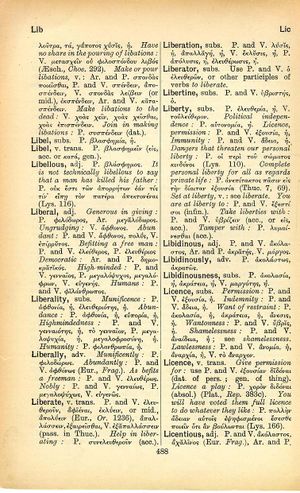libellous: Difference between revisions
From LSJ
Οὐ γὰρ ἀργίας ὤνιον ἡ ὑγίεια καὶ ἀπραξίας, ἅ γε δὴ μέγιστα κακῶν ταῖς νόσοις πρόσεστι, καὶ οὐδὲν διαφέρει τοῦ τὰ ὄμματα τῷ μὴ διαβλέπειν καὶ τὴν φωνὴν τῷ μὴ φθέγγεσθαι φυλάττοντος ὁ τὴν ὑγίειαν ἀχρηστίᾳ καὶ ἡσυχίᾳ σῴζειν οἰόμενος → For health is not to be purchased by idleness and inactivity, which are the greatest evils attendant on sickness, and the man who thinks to conserve his health by uselessness and ease does not differ from him who guards his eyes by not seeing, and his voice by not speaking
(CSV4) |
m (Woodhouse1 replacement) |
||
| Line 1: | Line 1: | ||
{{Woodhouse1 | {{Woodhouse1 | ||
|Text=[[File:woodhouse_488.jpg|thumb|link={{filepath:woodhouse_488.jpg}}]] | |Text=[[File:woodhouse_488.jpg|thumb|link={{filepath:woodhouse_488.jpg}}]] | ||
P. [[βλάσφημος]]. | ===adjective=== | ||
[[prose|P.]] [[βλάσφημος]]. | |||
[[it is not technically libellous to say that a man has killed his father]]: [[prose|P.]] [[οὐκ ἔστι τῶν ἀπορρήτων ἐάν τίς τίν' εἴπῃ τὸν πατέρα ἀπεκτονέναι]] (Lys. 116). | |||
}} | }} | ||
Revision as of 08:58, 20 May 2020
English > Greek (Woodhouse)
adjective
it is not technically libellous to say that a man has killed his father: P. οὐκ ἔστι τῶν ἀπορρήτων ἐάν τίς τίν' εἴπῃ τὸν πατέρα ἀπεκτονέναι (Lys. 116).

